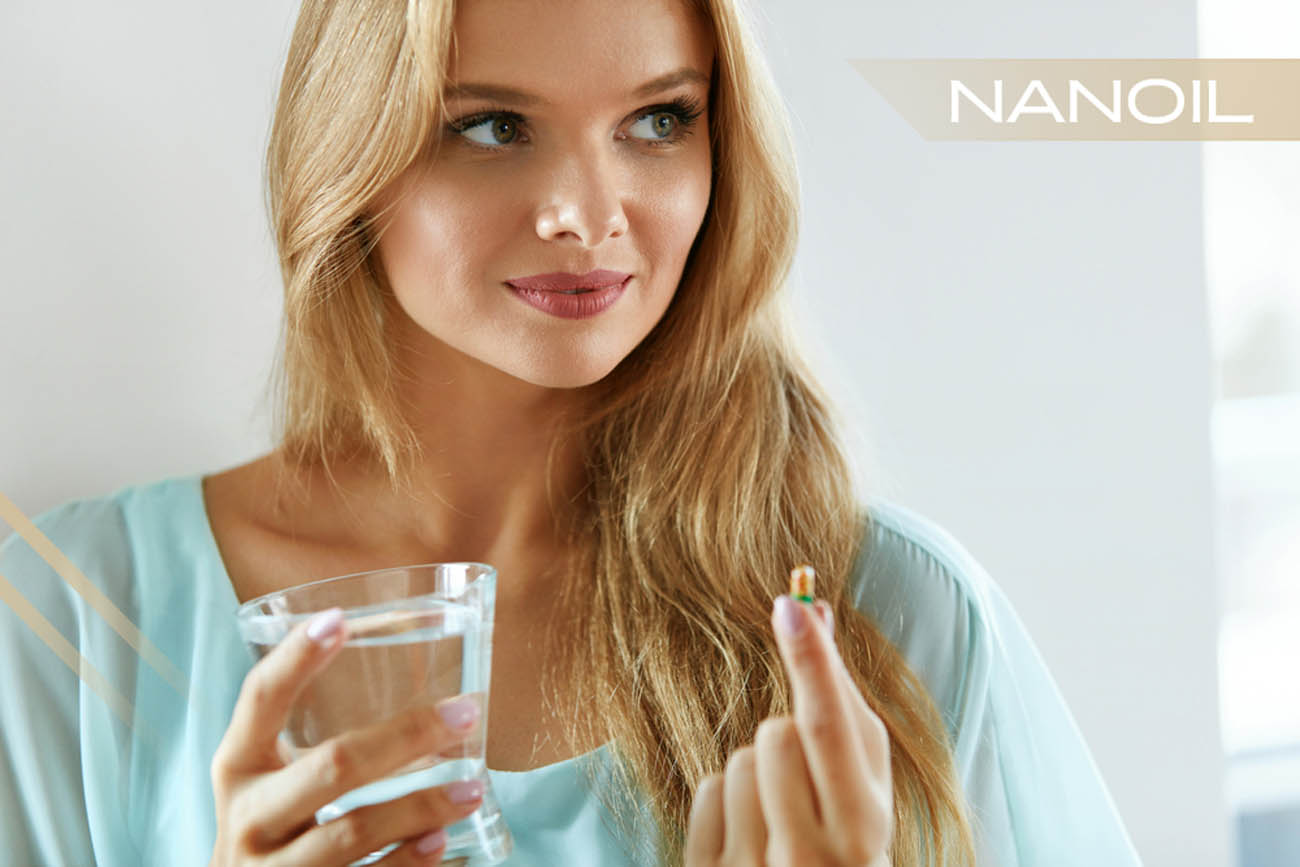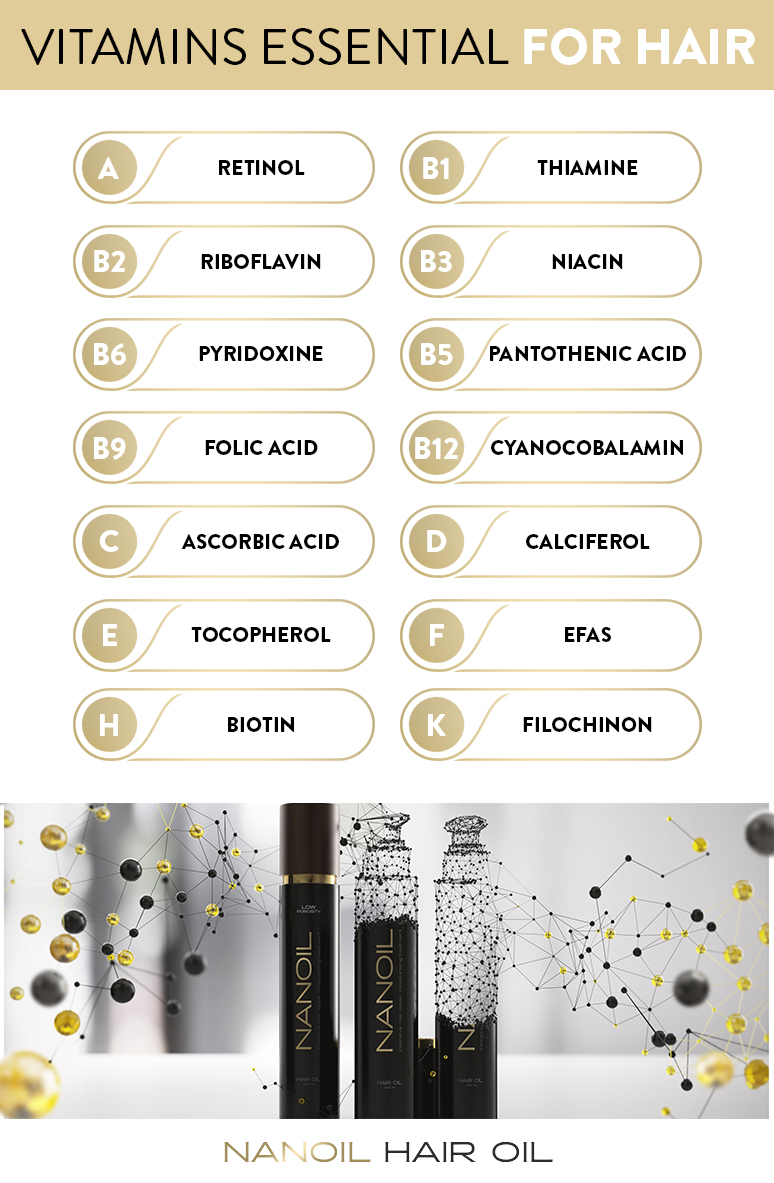- NANOIL Products
- Oils
- Face serums
- Hair masks
- Shampoos
- Hair conditioners
- Hair styling
- Care
- Hair Porosity Test
- Blog
- Contact

Saying that a strand of hair is a dead tissue is only partially true.
The hair shaft – the part that grows out of the skin, the same part that we take care of – is, in fact, dead.
Nevertheless, the layers of epidermis contain the most important part of our hair that is actually alive – the follicles. They are venous and supplied with blood, depending on the circulation in our body and the elements provided. Also, they hold the bulb which is the most important part. They are responsible for the looks, thickness, the strength and pace of the hair growth. One of the parts of hair is also the hair papilla – responsible for absorbing nutrients.
Being aware of how hair is built and the ways of functioning of the inner as well as outer parts are extremely important when it comes to choosing proper hair care. Such knowledge allows determining appropriate cosmetics and types of care. What is more, it emphasises that you cannot forget not only about the lifeless part but also the follicles. Strands require a range of ingredients responsible for their health, beauty and strength.
Hairology is some kind of a hair health encyclopaedia that describes how to nurture and nourish the strands to make them grow longer, stronger and full of vitality.

In general, vitamins are organic compounds with a variety of structures and properties. They are essential for proper functioning of the body. Because they are not exogenous (the body is not able to produce them) - they must be constantly supplied from the outside, for example, along with food. The condition and general well-being, as well as the beauty of our hair, skin and nails, depend on their presence.
VITAMIN A (retinol) - is responsible for the cycle of cell renewal in our body, including hair. It also protects the strands from the harmful effects of atmospheric agents and toxins from the environment. Vitamin A deficiency causes inhibited hair growing, increased fall out, as well as dryness and split ends.
VITAMINS FROM GROUP B:
- VITAMIN B1 (thiamine) - provides energy to skin cells, and is involved in the production of hair-building bricks - amino acids. Thanks to this, the hair does not fall out, and the hair matrix cells responsible for its growth receive the maximum dose of energy.
- VITAMIN B2 (riboflavin) - improves the so-called. "Cellular respiration" and provides tissues with high-energy that enables hair growth process. It also helps in cellular metabolism of fatty acids - thus preventing hair damage and enhancing its regeneration. It also affects the synthesis of amino acids involved in cell division in the hair matrix. In other words: it makes sure that your hair is always full of vitality and does not become damaged quickly.
- VITAMIN B3 (niacin), otherwise known as vitamin PP, provides hair with energy "mobilizing" its growth, and is responsible for the proper structure of the hair shaft as it affects the proper condition of the tissues that build the stem. It is a great addition to cosmetics because it does not cause irritation.
- VITAMIN B6 (pyridoxine) - is essential for hair growth because it provides "fuel" to the hair matrix, making the strands grow healthy and strong. Vitamin B6 is a kind of energy bomb, which is involved in the formation of glucose, the primary energy source. Thanks to pyridoxine, hair grows without any irregularities and is full of health.
- VITAMIN B5 - (pantothenic acid) - stimulates cell growth in the matrix responsible for hair growth and stimulates the building keratinocytes to efficiently produce keratin (the main protein building hair). In addition, vitamin B5 shields hair from damage by affecting the metabolism of fatty acids and contributes to the formation of an occlusive, protective layer on the strands.
- VITAMIN B9 (folic acid) - does not play a significant role in the process of hair restoration and but has some influence on the strength and condition of the bulbs. Therefore, it is worth ensuring its proper level in the body because its deficiency can cause increased hair loss.
- VITAMIN B12 (cyanocobalamin, cobalamin) - its deficiency can cause anemia, and as a result: increased hair loss. Vitamin B12 is also the only one whose significant deficiency can contribute to brightening and even total discolouration of the natural colour of the hair.
VITAMIN C (ascorbic acid) - is an extremely powerful antioxidant that fights free radicals in cells, slows down pathological processes that can take place in the body. It prevents hair loss, strengthens their elasticity and conditiones.
VITAMIN D (calciferol) - its deficiency intensifies hair loss especially in the telogen phase – resting period. Lack of vitamin D in the body accelerates the dying of the hair and removal from the skin. So the less vitamin D is in the body, the more hair goes from the growth phase to the resting phase - such a distortion of the proportions results in intense hair loss.
VITAMIN E (tocopherol) - Combats free radicals and helps transport vital nutrients to all cells in the body. It strengthens blood vessel walls and improves blood supply to the scalp, making it easier to work on the hair bulbs and making the hair more firmly rooted in the follicles. Its shortage makes strands become dull, fragile and deprived of flexibility.
VITAMIN F - is nothing else but polyunsaturated fatty acids (EFAs), which are vital for the proper functioning of the body. They are responsible for the most important processes in the cells, improve their functioning, strengthen the immune system and have a positive effect on the condition of the scalp and hair as they regenerate. EFAs also prevent hypoxia of body cells and instead make them young and allow proper functioning. Vitamin F predominates primarily in natural oils, so oiling the hair is so important for its health and beauty.
VITAMIN H (also classified as vitamin B7) - commonly called biotin. Biotin contains significant amounts of active sulphur molecules, and these are necessary in the formation of keratin (the most important protein for hair, the main building block of the matrix). Biotin directly influences the keratinisation process. Thanks to it, it goes well and the hair gains thickness, elasticity and stops breaking and crumbling.
VITAMIN K (filochinon) - There is no significant role in the care of the hair shaft, but hair bulbs suffer a lot from its deficiency. Why? They lose their strength. Hair with vitamin K deficiency becomes loser in the follicle - it is especially problematic when the hair is affected by seborrheated sebaceous glands - then hair overloaded with sebum may just slip out of the follicle. This results in thinning of the hair.
Because of the fact that the human body is not able to produce vitamins on its own, we must remember to deliver them every day and in proper doses. It is worth mentioning that they are first used in processes responsible for health and vitality, and only later (if there is enough) for care and beautifying purposes. If a vitamin deficiency occurs - the hair, the skin and nails suffer. It is therefore essential to provide regular hair treatments, preferably with the use of natural oils, which are the sources of vitamins and minerals. Natural oils are to be applied to both the hair and scalp. As a result, the hair is provided with comprehensive care and nutrition all the way from the bulbs to the ends.
Comments: #0